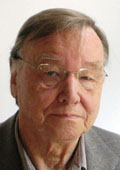Awardee Interviews | Biography: Dietrich Menzel
Dietrich Menzel

Prof. Dietrich Menzel, Fritz Haber Institute, Max-Planck Society and Technical University Muenchen, Germany, “for major ground breaking and sustained contributions towards a comprehensive understanding of the energy transfer processes influencing the physical and chemical behavior of atomic and molecular species on metal surfaces”
Dietrich Menzel is professor emeritus at the Physik-Department, Technical University of Munich (TUM) in Garching/Germany, and an external scientific member of the Fritz-Haber- Institut, Max-Planck Society, in Berlin/Germany. He has been an important contributor to the development of present day surface science from early on, and contributed insights in many aspects of the chemical physics of adsorbates and coadsorbates, and of basic surface reactions. He has carried out research in surface science and nanoparticles in Berlin, Munich, and Trieste. He has published over 380 research papers with around 14500 citations.
He holds a Diploma in Chemistry in 1959, and a Ph.D. degree in Physical Chemistry in 1962, from Technische Hochschule Darmstadt (THD), Germany. From 1962 to 1964 he was a postdoc with Robert Gomer at the James Franck Institute, University of Chicago, where he did ground-breaking research on electronically induced desorption. He then moved back to THD and got his Habilitation in 1967. In 1969 he moved to Munich as a group leader in the Institute of Physical Chemistry of TUM. In 1973 he became a newly created chair professor for Surface Physics at the Physik-Department of TUM which he held to his retirement in 2003. In these 30 years he worked on adsorption and desorption kinetics and dynamics, electronic and vibrational structure of adsorbates, electronically induced surface reactivity, surface geometry, and ultrafast surface processes. Often he and his group developed new instrumentation. In the last years he has also worked on metal nanoparticles (in Berlin) and on graphene surfaces (in Trieste); in Munich he is participating in a collaborative research project on attosecond electron spectroscopy. Many of his projects involed synchrotron radiation (SR) sources at several locations. In this connection he was a member of various governing and advisory bodies of the SR sources including BESSY and DESY in Germany, and Elettra in Italy. He has also worked at SSRL in Stanford and at the ALS in Berkeley. He has many international collaborative efforts with experimental and theoretical groups in Europe, America, and Asia. He has been a member of advisory and organising committees of numerous international conferences. He has received several prestigious awards including “Akademiepreis in Chemistry”, Academy of Sciences at Goettingen 1969; External scientific member of Fritz-Haber Institute, Max- Planck Society 1989; Max-Planck Research Prize for International Cooperation 1997; honorary doctorate from Dalhousie University, Halifax/ Canada 1999; “Robert Wichard Pohl Prize” of the German Physical Society 2000; Fellow, Royal Society of Chemistry, London 2009; “Microprobe Analysis Award”, Japanese Society for the Promotion of Science 2011; and Fellow of Elettra, Sincrotrone Trieste 2012.
An important aspect of his work concerned the education and promotion of young researchers. He educated about 50 Ph.D. students and 100 Diploma (~Master) students and hosted more than 30 postdocs and many visiting scientists and guest professors. More than 15 of his former students or postdocs held or hold professorships or Max-Planck directorships.